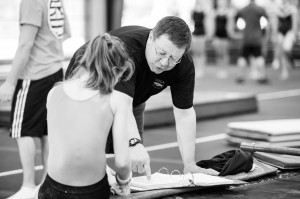I have just returned from a training camp in Iceland. Problems which I thought were more North American are evidently more universal. The question I propose is:
Where are the coaches?
There seems to be a crisis in coaching. Who and where are prospective coaches being taught how to COACH and how to TEACH? Sport and Exercise science has replaced physical education in college and university programs with a curriculum heavy on the sciences and no emphasis on pedagogy, HOW TO TEACH. Over the past few months I have seen numerous examples of this. As a colleague in Iceland observed:
most young “coaches” today could not organize a drinking contest in a brewery.”
Being able to explain all the substrates involved in muscle contraction or knowing what genetic signals are being turned off or on may be important in the laboratory but in the gym it comes down to the ability to coach, to teach, organize and motivate.
That is fundamental pedagogy. Who is being taught that anymore? I am sure there are some great programs out there- please let me know what they are. The exercise science/wellness oriented college curriculums are turning out personal trainers, personal training is NOT coaching. Coaching is teaching, organizing, and leading. Coaching is knowledge of fundamental skills and how to teach them, it is understanding progressions and age appropriate training.
I had a coach once ask me, “Where did you get your first elite gymnast?” As if I were able to go into a store and pick out an athlete. Coaching at ANY level requires dedication, commitment & working until the job is done. It is not a two-hour a day proposition where you show up “coach” & leave. At the Elite level you need an all encompassing program. Thought needs to be given to every aspect of the program. But still 90% of coaching is grunt work & it is the grunt work that often determines success or failure. Coaching is something you are, not something you do. It is not for the faint of heart or dilettantes.
 Just because you are “certified” does not mean you are prepared to coach. Most of the certification programs (and I teach a lot of them) require no proficiency in teaching. Most programs involve sitting in a classroom or gym for hours or days and looking at slides and video in a mind numbing exercise in futility. To be certified as a coach you need to show you can coach not just take a paper and pencil test. We must wake up and do something to rectify this. Coaching is the lifeblood of our sport. Just look at the alarming rate of injury in our sport at all levels, look at some of the poor fundamental skills at the highest level of sport, those trends did not happen by chance. The injuries and poor skills may be closely tied to the decline of trained coaches. All of you who care must take action. We all do training of younger coaches in our gyms. Take it beyond the skills and teach them how to teach and be a better communicator.
Just because you are “certified” does not mean you are prepared to coach. Most of the certification programs (and I teach a lot of them) require no proficiency in teaching. Most programs involve sitting in a classroom or gym for hours or days and looking at slides and video in a mind numbing exercise in futility. To be certified as a coach you need to show you can coach not just take a paper and pencil test. We must wake up and do something to rectify this. Coaching is the lifeblood of our sport. Just look at the alarming rate of injury in our sport at all levels, look at some of the poor fundamental skills at the highest level of sport, those trends did not happen by chance. The injuries and poor skills may be closely tied to the decline of trained coaches. All of you who care must take action. We all do training of younger coaches in our gyms. Take it beyond the skills and teach them how to teach and be a better communicator.
Go to your school boards and ask hard questions about who is coaching the children in the school system.
We can and must improve coaching because coaching matters. And coaches (like you) make a difference.




